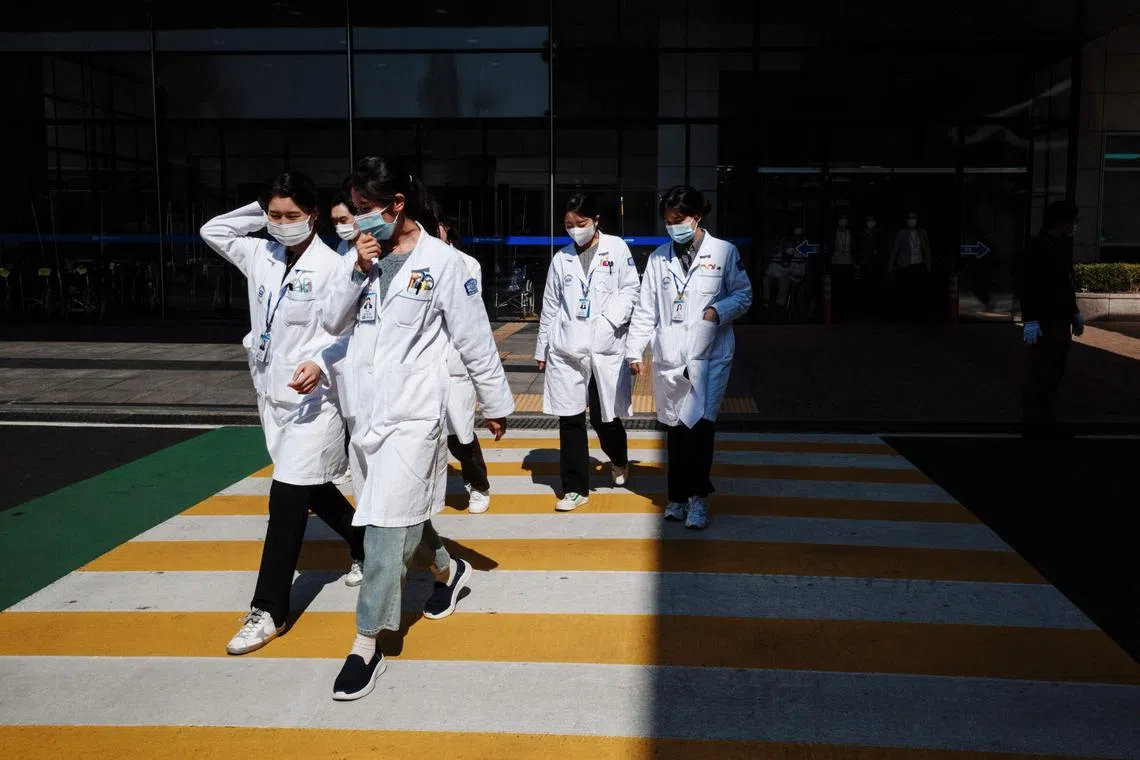South Korea provides more funds for healthcare during doctors’ walkout
Sign up now: Get insights on Asia's fast-moving developments

South Korea’s government has shown a willingness to discuss issues related to working conditions and pay.
PHOTO: AFP
Follow topic:
SEOUL – South Korea’s government lined up more money to support a healthcare system hit by a walkout by thousands of trainee doctors
The government will promptly provide 39.3 billion won (S$40 million) in reserve funds to national and local medical centres that are extending hours to fill gaps in coverage, Vice-Health Minister Park Min-soo said at a news briefing on March 13.
The standard of inpatient care and occupation of beds at intensive care units are at levels similar to before the walkout, which is in its fourth week, Mr Park said. He added that the government is allotting extra pay to doctors and nurses providing care during the labour action.
“Healthcare reform should no longer be blocked by opposition from certain professions,” he said, adding that protecting lives and minimising gaps in access to care for the sick “is a top priority for the government”.
Mr Park announced the government would provide up to 18 million won a month for doctors and up to 4 million won a month for nurses, starting from March, to medical institutions that are hiring staff.
More than 90 per cent of the country’s 13,000 trainee doctors, who play key roles in providing emergency care and surgery, walked off the job to protest against a government plan to increase enrolment at medical schools by 2,000 spots a year from the current 3,058.
About 30 per cent of the country’s 18,793 medical students have formally filed requests for leaves of absence and more are looking to do so to show their support, Yonhap News Agency reported.
President Yoon Suk-yeol’s administration is standing by the plan it says is essential for providing care
The number of medical school seats, set by the government to keep control of the number of doctors, has not risen for nearly three decades.
Apart from increasing enrolments, the government is working with universities in various regions outside the Seoul area to increase spots at their medical schools from the next academic year as a way to have more doctors eventually work in areas seen as under-served.
Mr Yoon’s government has shown a willingness to discuss issues related to working conditions and pay.
But it has stood firm by its plans on medical enrolments, which it said would eventually help fill shortages for specialists in fields such as paediatrics.
Doctors leading the protest contend that the enrolment plan will not fix fundamental problems such as a dearth of physicians in vital fields, a concentration of doctors in urban areas and an array of legal risks.
They are seeking more details from Mr Yoon’s government that address their concerns.
South Korea has sent notices to about 5,000 of the trainee doctors
The notices are part of the procedure for suspending the licences of thousands of trainee doctors
Mr Yoon’s government has also threatened to revoke the licences of doctors for leading a labour action that it says violates medical laws.
Mr Yoon’s approval rating has climbed during the walkout to its highest since July 2023.
This could help his conservative People Power Party in April elections as it tries to take control of Parliament from the progressive Democratic Party. BLOOMBERG

